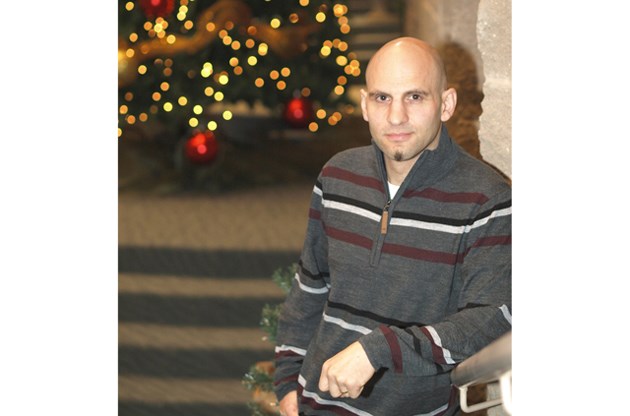Stef Piva has a few usual Christmas traditions: decorating a tree, having dinner with family and arranging a festive front yard display that this year, he concedes, is short a light strand or two.
“All we have right now is this one tree, and half of it (is covered with lights),” he laughs. “It’s not very good.”
Another Christmas custom of his: going to church.
Piva is lead pastor at Bethany Baptist Church in Richmond’s Hamilton neighbourhood. The service marking the season is Christmas Eve, but on Dec. 25 the church will host a potluck dinner catering to those who might otherwise be alone for the holiday. Piva will spend time there and then gather with family, including his parents visiting from Alberta.
It’s in Wild Rose Country, just outside Edmonton, where Piva grew up. From his neatly-arranged Richmond office, the 42-year-old father of three explains his early connection to the church.
“I would come home and play church in my basement. I used to set up all of these chairs with my teddy bears and I would preach sermons to them and I would serve them communion.”
Some might say he was given a sign even earlier. Baptized in a Catholic church as an infant, a priest gave him a crisp white shawl instead of the usual candle. His parents later learned the shawl is reserved for priests upon ordination.
Piva jumped into theology after high school, earning his bachelor of religion and master of divinity degrees before completing his doctorate at a Boston-area seminary. He entered full-time ministry in 2000, and has served in Richmond for the past five years.
Piva also has a passion for teaching. He’s taught writing at local community centres and preaching as far away as Cameroon, where he’ll visit again in January. He’s also taught would-be pastors about depression — the focus of his doctoral studies. There’s plenty of burnout within ministry, he said, along with other professions that involve helping people.
“In order to be healthy in ministry — and really this translates into all life — we have to be healthy in all areas of our life. Sometimes, pastors can be so focused on their spiritual health that they can neglect their physical health (and) relational health.”
Piva stays balanced with daily bike workouts, playing and coaching soccer, reading and building puzzles — an activity with a definitive end.
“I worked for my dad for a few summers when I was in high school. He’s a painter. There’s something nice about being able to paint a room and then you’re done. You can walk out and say: I did that. You need to have some of that.”
His early memories of Christmas involve experiences, not receiving gifts, like the time his parents surprised neighbours in need by filling their freezer with meat, or the year he saw starving children on a World Vision TV commercial.
“I remember being really impacted by that, and telling my parents we should give to some of these children. My parents said we can do that, but...we’re going to forgo gifts,” he said. “I’m not trying to say I had a halo when I was a kid, but for whatever reason I said, ‘OK. I’m willing to do that.’”
Meanwhile, the War on Christmas — as some observers have called the movement to make celebrations more secular — continues. But Piva isn’t too concerned. That ideal Norman Rockwell Christmas some people long for, he said, isn’t the true message of the season.
“To me the actual message of Christmas is much more subversive,” he said. “Jesus is for the poor, he’s for the refugee, he’s for the forgotten and the lost. In some ways I think there’s an opportunity for the true Christian story to shine a bigger light on what the actual message is in a more secular society.”
To help reclaim that message, his church has committed to sponsoring a refugee family from Syria and continuing outreach work such as First Gift, whose volunteers visit maternity wards — Christmas Day included — bearing gifts for at-risk or drug-addicted mothers.
Said Piva: “(Christmas) is a chance for the church to be the church, even more so.”



